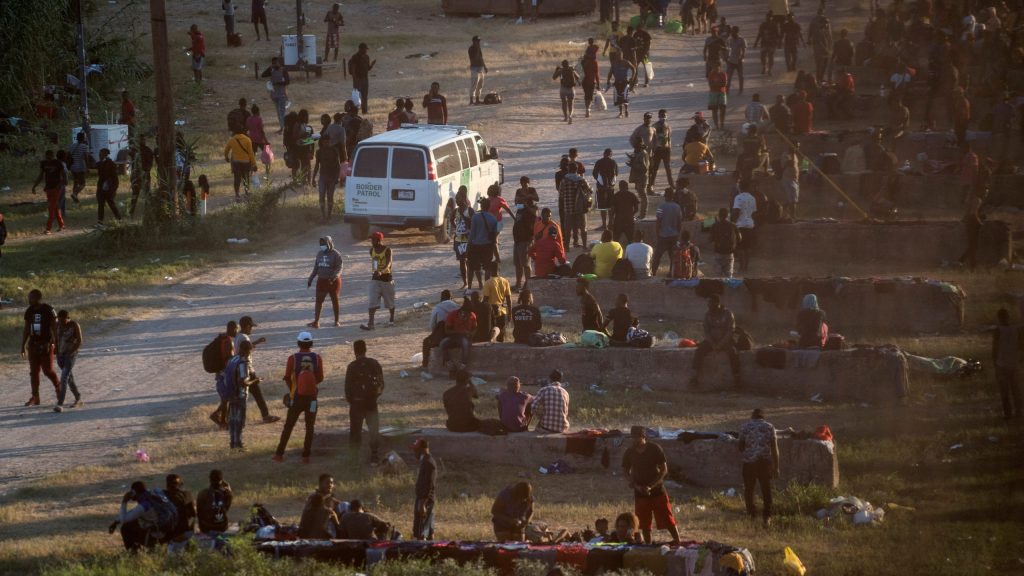When Catholic Charities San Antonio staged a trip to the Del Rio International Bridge Saturday, the purpose was twofold: They drove down with essential items for the thousands of migrants stationed there, and subsequently brought migrant families back inland to help them continue their U.S. journey.
The number of migrants in Del Rio rose through the weekend as it did throughout the week, reaching an estimated 13,000 on Sunday, according to Catholic Charities San Antonio president and chief executive officer Antonio Fernandez.
“We brought them thousands of items like diapers for kids, water, food, blankets, clothing, and then on the way back brought people back to San Antonio because the biggest problem we have to solve is how do we get them out of there as quick as possible so they can get to their families and friends,” Fernandez told Crux. “That is my biggest priority right now.”
Del Rio is about 150 miles west of San Antonio.
Catholic Charities San Antonio housed an organization-record 150 people – all families – in San Antonio last night through partnerships with local hotels. The organization has six employees that work to provide tickets for the families to their next destination, as well as food, shelter and other essentials while they are with them.
Fernandez said they didn’t have the capacity to test the 150 people for COVID-19, but they did take temperatures and use personal protective equipment. He couldn’t speak to whether or not the federal government tests the migrants before releasing them into their custody.
Fernandez said they will continue to help families this week. As is the same at all six ports of entry along the Texas-Mexico border, the majority of single adult migrants arriving to Del Rio will be expelled by the federal government under Title 42, which allows the expulsion of migrants on health grounds. The federal government takes care of unaccompanied minors, and it refers families to organizations like Catholic Charities.
The number of migrants seeking asylum in the U.S. has increased across the border for months. The challenge in Del Rio is that it covers only a small section of the border, and doesn’t have the infrastructure or capacity to handle this high volume. Fernandez said for the last two years there’s been a regular flow of 50-200 migrants at the Del Rio port of entry, so what’s happening now has “overwhelmed the whole system in the southwest United States.”
On Saturday, the Department of Homeland Security released a six-part plan of action to address the increase in migrants in Del Rio. It includes adding 400 agents to the Del Rio sector of the border to control the area, with more available if needed. Part of the strategy is also rerouting migrants from Del Rio to other processing locations, and an acceleration of removal flights to Haiti where the majority of the migrants came from.
Haiti has faced two tragedies in recent months: President Jovenel Moïse was assassinated in July, then a 7.2 magnitude earthquake in August destroyed buildings and homes and killed thousands.
Other deportation flight destinations were Mexico, Ecuador, Guatemala, El Salvador and Honduras.
Immigration advocates have long spoken out against Title 42 because it limits a migrants legal right to seek asylum. Fernandez personally said he believes the migrants should be allowed to come make their asylum claims in the U.S. given the situations they’re often fleeing and the amount of “time, energy, money and suffering” they’ve endured for months.
Legally, he acknowledged it’s more complicated than calling the Title 42 situation from the Trump administration to the Biden administration, which now sees the Texas government and Biden administration at odds, simply “chaos.” Fernandez lamented the situation late last week where the federal and Texas government went back and forth blaming each other for a miscommunication over closing certain ports of entry along the border, calling it “politics.”
He echoed what other Catholics leaders along the border often say, that the organization’s focus remains on serving the person in front of them.
“In all of this madness, every single person that has come to Catholic Charities has received housing, regardless of where they come from and we will do the same thing this coming week,” Fernandez said. “We are here waiting with a smile welcoming people as much as we can and we know that whatever we need to do for people knocking at our doors we will provide.”

